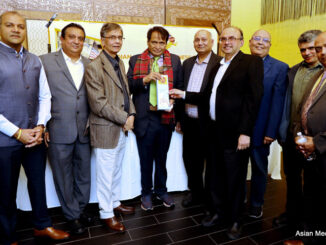
It is my hope that Prime Minister Modi and his government will recognize how a deeper strategic partnership with the US serves India‘s national interests, especially in light of current economic and geopolitical challenges”, says the author.
Iwant Prime Minister Modi to succeed because I want India to succeed. It is no secret that the past few years have been challenging ones for India – political gridlock, a flagging economy, financial difficulties, and more. It is not my place or that of any other American to tell India how to realize its full potential.
That is for the Indians to decide. Our concern is simply that India does realize its full potential, for the United States has a stake in India’s success. It is also no secret that India and the US have not been reaching our full potential as strategic partners over the past few years, and there is plenty of blame to be shared on both sides. Too often recently we have slipped back into a transactional relationship.
We need to lift our sights again. The real reason India and the US have resolved to develop the strategic partnership is because each country has determined independently that doing so is in its national interests. It is because we have been guided by our national interests that the progress of our partnership has consistently enjoyed bipartisan support in the US and in India.
When it comes to the national interests of the US, the logic of a strategic partnership with India is powerful. India will soon become the world’s most populous nation. It has a young, increasingly skilled workforce that can lead India to become one of the world’s largest economies.
It is a nuclear power and possesses the world’s second largest military. It shares strategic interests with us on issues as diverse and vital as defeating terrorism and extremism, strengthening a rules-based international order in Asia, securing global energy supplies, and sustaining global economic growth. We also share common values. It is because of these shared values we are confident that India’s continued rise as a democratic great power will be peaceful and thus can advance critical US national interests.
That is why, contrary to the old dictates of realpolitik, we seek not to limit India’s rise but to bolster and catalyze it – economically, geopolitically, and, yes, militarily. It is my hope that Prime Minister Modi and his government will recognize how a deeper strategic partnership with the US serves India’s national interests, especially in light of current economic and geopolitical challenges.
For example, a top priority for India is the modernization of its armed forces. This is an area where US defense capabilities, technologies, and cooperation can benefit India enormously. Similarly, greater bilateral trade and investment can be a key driver of economic growth in India. Put simply, I see three strategic interests that India and the US clearly share, and these should be the priorities of a reinvigorated partnership. First, to shape the development of South Asia as a region of sovereign democratic states that contribute to one another’s security and prosperity; second, to create a preponderance of power in the Asia-Pacific region that favors free societies, free markets, free trade, and free comments; and, finally, to strengthen a liberal international order and an open global economy.
It is important for US leaders to reach out personally to Prime Minister Modi, especially in light of recent history. That is largely why I am traveling to India, and that is why I am pleased President Obama invited the prime minister to visit Washington. When the prime minister comes to Washington, I urge our congressional leaders to invite him to address a joint session of Congress.
Yet we must be clear-eyed about those issues that could weaken our strategic partnership. One is Afghanistan. Before it was a safe haven for the terrorists who attacked America on September 11, 2001, Afghanistan was a base of terrorists that targeted India. Our Indian friends remember this well, even if we do not. For this reason I am deeply concerned about the consequences of the president’s plan to pull all of our troops out of Afghanistan by 2016.
If Afghanistan goes the way of Iraq in the absence of US forces, it would leave India with a clear and present danger on its periphery. It would constrain India’s rise and its ability to devote resources and attention to shared foreign policy challenges elsewhere. It would erode India’s perception of the credibility and capability of US power and America’s reliability as a strategic partner.
The bottom line here is clear: India and the US have a shared interest in working together to end the scourge of extremism and terrorism that threatens stability, freedom, and prosperity across South Asia and beyond.
I hope the president will be open to reevaluating and revising his withdrawal plan in light of conditions on the ground. Another hurdle on which our partnership could stumble is our resolve to see it through amid domestic political concerns and shortterm priorities.
If India and the US are to build a truly strategic partnership, we must each commit to it and defend it in equal measure. We must each build the public support needed to sustain our strategic priorities, and we must resist the domestic forces in each of our countries that would turn our strategic relationship into a transactional one.
If the 21st century is defined more by peace than war, more by prosperity than misery, and more by freedom than tyranny, I believe future historians will look back and point to the fact that a strategic partnership was consummated between the world’s two preeminent democratic powers: India and the United States. If we keep this vision of our relationship always uppermost in our minds, there is no dispute we cannot resolve, no investment in each other’s success we cannot make, and nothing we cannot accomplish together.





Be the first to comment